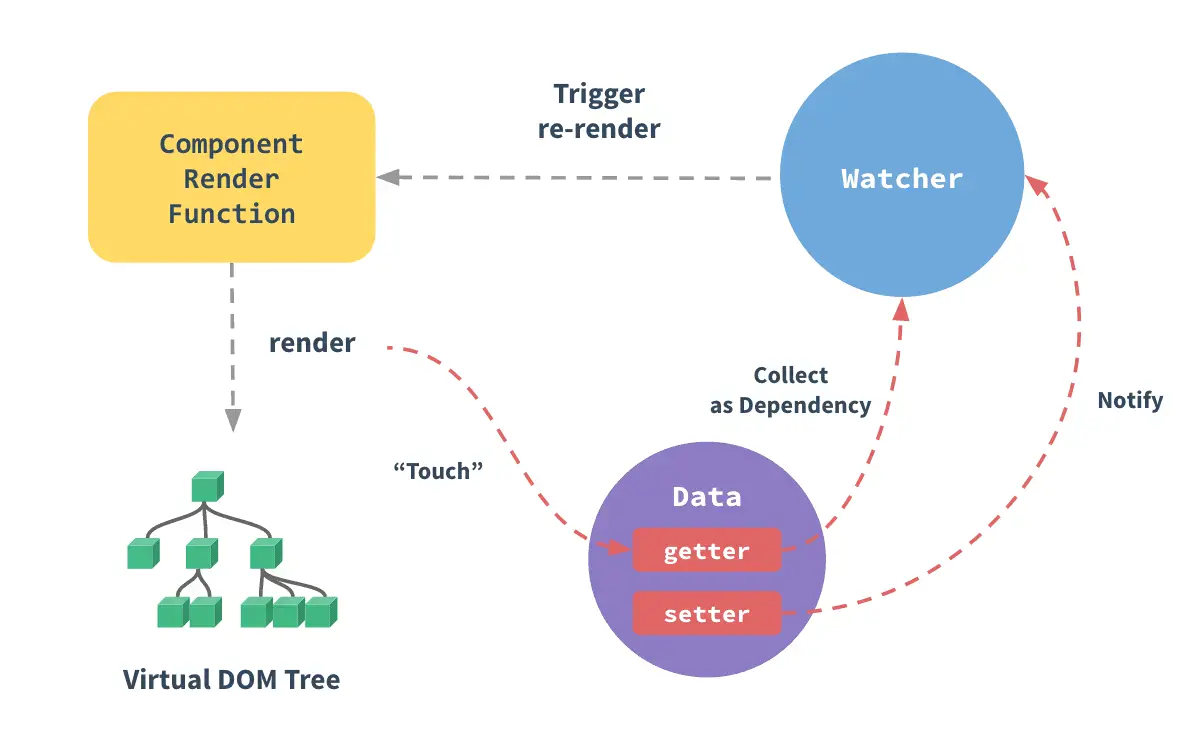实现vue2的mvvm
Sonder
2024-06-24
7372字
18分钟
浏览 (2.4k)

vue2实现mvvm原理
- 数据劫持
- 主要通过 Object.defineProperty() 这个方法实现
- 发布订阅模式(观察者模式)
html
<html lang="en">
<head>
<meta charset="UTF-8">
<meta name="viewport" content="width=device-width, initial-scale=1.0">
<title>Document</title>
</head>
<body>
<div id="app">
{{title}}
<p>我叫:{{name}},今年:<b>{{age}}</b>岁</p>
<p>爱好:{{hobby}}</p>
<p>车:{{car.benz}}、{{car.bmw}}、{{car.adui}}</p>
标题:<input type="text" v-model="title" value="" />
<br>
我叫:<input type="text" v-model="name" value="" />,
今年:<input type="text" v-model="age" value="" />岁。
<br>
想买:<input type="text" v-model="car.benz" value="" />、
<input type="text" v-model="car.bmw" value="" />、
<input type="text" v-model="car.adui" value="" />车
</div>
<script src="mvvm.js"></script>
<script>
let mvvm = new Mvvm({
el: "#app",
data: {
title: '个人信息',
name: 'cxk',
age: 18,
hobby: ['唱', '跳', 'rap'],
car: {
benz: '奔驰s级',
bmw: '宝马5系',
adui: '奥迪A系'
}
}
})
</script>
</body>
</html>mvvm.js
function Mvvm(options = {}) {
this.$el = options.el
this.$data = options.data
// 数据劫持
new Observe(options.data)
// 数据代理
for (let key in options.data) {
Object.defineProperty(this, key, {
enumerable: true, // 可枚举
configurable: true, // 可配置
get: function () {
return options.data[key]
},
set: function (newVal) {
options.data[key] = newVal
}
})
}
// 解析编译
new Compile(options.el, this)
}
// 解析编译
class Compile {
constructor(el, vm) {
this.el = el
this.vm = vm
// 解析编译
this.el = document.querySelector(el)
// 在内存中创建一个文档碎片
let fragment = document.createDocumentFragment();
let child
while (child = this.el.firstChild) {
// appendChild具有移动性,移一个少一个
fragment.appendChild(child)
}
// 在内存中编译解析
this.compile(fragment, vm)
// 将内存中的文档碎片替换到真实页面
this.el.appendChild(fragment)
}
compile(node, vm) {
node.childNodes.forEach(child => {
// 判断是不是元素节点
if (child.nodeType == 1) {
// 递归遍历元素节点
this.compile(child, vm)
// 编译元素节点
this.compileEle(child, vm)
} else {
// 编译文本节点
this.compileText(child, vm)
}
})
}
// 编译文本
compileText(node, vm) {
// 首先保存原本的文本内容
let text = node.textContent // 车:{{car.benz}}、{{car.bmw}}、{{car.adui}}
let reg = /\{\{(.[^\}]*)\}\}/g
// 如果匹配到有值了才{{}}这种格式就进行编译
if (reg.test(text)) {
// 遍历将原本文本节点的{{}}依次替换成对应的值
let content = text.replace(/\{\{(.[^\}]*)\}\}/g, (...args) => {
// 设置监听,这里利用闭包访问了原本的text
new Watcher(vm, args[1], function () {
// 遍历将原本文本节点的{{}}依次替换成对应的值
let content = text.replace(/\{\{(.[^\}]*)\}\}/g, (...args) => {
return getval(vm, args[1])
})
node.textContent = content
})
return getval(vm, args[1])
})
node.textContent = content
}
}
// 编译元素(v-model)
compileEle(node, vm) {
var attr = node.attributes;
// attr是类数组,通过展开运算符让其可遍历
[...attr].forEach(attr => {
let { name, value } = attr
if (name == 'v-model') {
// 设置监听
new Watcher(vm, value, function (newValue) {
node.value = newValue
})
// 双向绑定
node.addEventListener('input', function (e) {
let newvalue = e.target.value
var arr = value.split('.')
arr.reduce((data, current, index) => {
if (index == arr.length - 1) {
data[current] = newvalue
}
return data[current]
}, vm)
})
// 给v-model属性设置监听后,此时元素的v-model的数据就和data关联了,可以把这个属性移除了
node.removeAttribute('v-model')
}
})
}
}
// 将{{car.benz}} {{car.bmw}}等转化为对应的值
function getval(vm, expr) {
let val = vm;
var arr = expr.split('.')
arr.forEach(k => {
val = val[k]
})
return val
}
// 数据劫持
class Observe {
constructor(data) {
this.observe(data)
}
observe(data) {
// 遍历将每一个数据分别定义响应式,分别监听
for (let key in data) {
this.defineReactive(data, key, data[key])
}
}
// 定义响应式
defineReactive(obj, key, val) {
if (typeof val == 'object') {
this.observe(val)
}
var dep = new Dep();
console.log(dep);
Object.defineProperty(obj, key, {
enumerable: true, // 可枚举
configurable: true, // 可配置
get: function () {
// 只有new Watcher了,Dep.target才会有值(watcher实例),有值就将它插入观察者队列
if (Dep.target) {
dep.addsub(Dep.target);
}
return val
},
set: function (newVal) {
// 如果新值和旧值一样,则不发布更新
if (newVal == val) {
return
}
val = newVal
dep.notify();
}
})
}
}
// 观察者
class Dep {
constructor() {
this.subs = []
}
addsub(sub) {
this.subs.push(sub)
}
notify() {
// 遍历观察者队列,全部更新
this.subs.forEach(sub => sub.update())
}
}
// 被观察者
class Watcher {
constructor(vm, expr, fn) {
this.vm = vm;
this.expr = expr;
this.fn = fn;
this.oldValue = this.get()
}
get() {
// 只要new Watcher了,就会调用这个方法,将这个watcher实例赋值给全局的Dep.target
Dep.target = this;
let oldValue = getval(this.vm, this.expr)
this.update();
Dep.target = null;
// 如果获取的expr是值类型(字符串,数字...),则直接返回oldValue
// 如果获取的expr是引用类型(数组,对象),则重新拷贝一份,返回给oldValue
if (Object.prototype.toString.call(oldValue) == '[object Array]') {
let old = [...oldValue]
oldValue = old
}
return oldValue
}
update() {
let newValue = getval(this.vm, this.expr)
// 如果新旧值不一样,则将新值作为参数传给回调函数并执行
if (newValue !== this.oldValue) {
this.fn(newValue)
}
}
}